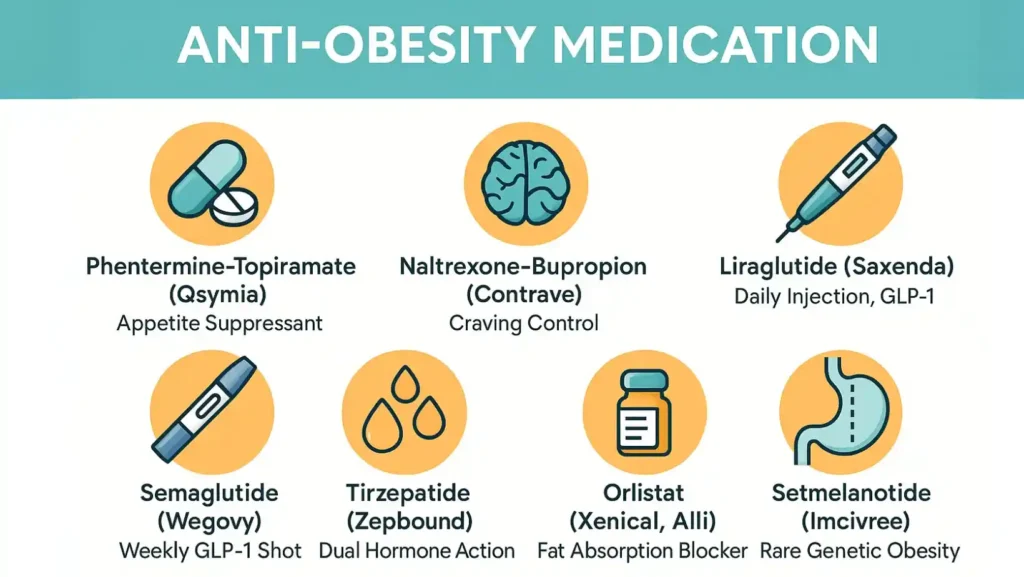Anti obesity medication has changed how doctors manage excess weight and related health problems. While diet and exercise remain the first line of defense, many people struggle to lose enough weight through lifestyle changes alone. That is where prescription weight loss medication comes in. These drugs are not magic fixes but tools backed by research that can help patients reduce weight, improve blood sugar, and lower heart risk when combined with lifestyle support. Today, there are several FDA approved anti obesity drugs that work through different pathways, ranging from appetite control to fat absorption.
This article will take you through the seven main anti-obesity medication options available, their science, side effects, and who they are right for.
Phentermine-Topiramate (Qsymia)

Phentermine-topiramate is a combination pill that works in two ways. Phentermine is a stimulant that acts as an appetite suppressant by affecting the nervous system. Topiramate, originally used for seizures and migraines, reduces cravings and changes taste preferences. Together, they make food less tempting and help patients feel full with smaller portions.
Doctors often prescribe Qsymia for patients with BMI ≥30 medication eligibility or for those with weight-related health conditions such as Diabetes or high blood pressure. Studies show patients can lose 8–10% of their body weight within a year when paired with diet adjustments.
However, it is not free of risk. Side effects include insomnia, dry mouth, tingling in fingers, and mood changes. Women must avoid it during pregnancy because it increases the chance of birth defects. Doctors usually start with a low dose and increase gradually to reduce side effects.
Qsymia represents one of the earliest modern FDA approved weight loss drugs and continues to be effective for those who respond well to it.
Naltrexone-Bupropion (Contrave)
Contrave combines naltrexone-bupropion, a drug used for addiction treatment, with an antidepressant. Together, they affect the brain’s reward system. Many people overeat not just from hunger but from cravings linked to pleasure and habit. Contrave reduces that drive, making it easier to resist overeating.
Patients who respond best to Contrave are those with emotional eating patterns. It is less effective in people who eat out of routine rather than craving. Side effects can include nausea, constipation, headache, and increased blood pressure. Doctors also warn that it may not suit patients with seizure disorders.
Contrave is considered a prescription-only weight loss solution. It offers an option for patients who have struggled with food cravings and compulsive eating, conditions not well addressed by other drugs.
Liraglutide (Saxenda) – Prescription Weight Loss Injection
Liraglutide is a daily weight loss injection sold under the brand Saxenda. It mimics a natural gut hormone called GLP-1. This hormone controls how quickly the stomach empties and how the brain perceives hunger. With liraglutide, food moves slower through the stomach, so patients feel full longer.
In trials, people using Saxenda lost about 8% of their weight after a year. That may sound small, but for someone weighing 100 kg, that is an 8 kg drop with significant benefits for blood pressure and blood sugar.
The main side effects are nausea, vomiting, and occasional pancreatitis. Still, liraglutide is a safe option for many, especially those with obesity-related health risks like type 2 Diabetes. Doctors also like Saxenda because it provides safe weight loss therapies for long-term use when monitored closely.
Semaglutide (Wegovy) – Weekly Weight Loss Shot
Semaglutide is another GLP-1 drug, but unlike Saxenda, it is given as a weekly weight loss shot. This once-a-week option has changed obesity treatment. Wegovy has shown results far beyond most other drugs, with patients losing 15–20% of their starting weight in large trials.
Semaglutide works by lowering appetite, changing how the brain responds to food cues, and slowing digestion. Beyond weight, it also reduces risk of heart attacks in people with obesity and cardiovascular disease.
Common side effects include nausea, diarrhea, and constipation. Doctors titrate the dose slowly to help patients adjust. Insurance coverage can be challenging, as costs are higher than older drugs, but it remains one of the strongest FDA approved anti obesity drugs today.
Tirzepatide (Zepbound)
Tirzepatide is the newest player in the field. Marketed as Zepbound for obesity, it mimics two gut hormones instead of one. This dual action makes it one of the most powerful drugs in terms of weight loss.
In studies, patients lost more than 20% of their body weight, something once only achievable with surgery. Tirzepatide helps with appetite control, improves insulin sensitivity, and may lower the risk of metabolic syndrome treatment complications.
Side effects are similar to other GLP-1 agonists, mainly stomach upset, nausea, and diarrhea. Because of its strong effect on insulin, doctors monitor patients with Diabetes closely to avoid low blood sugar.
Tirzepatide is a breakthrough among FDA approved weight loss drugs and is expected to become a standard choice for many eligible patients.
Orlistat (Xenical, Alli) – Best Weight Loss Pill For Obesity
Orlistat works differently from hormone-based drugs. Instead of affecting appetite, it is a fat absorption inhibitor. When taken with meals, it blocks an enzyme that breaks down fat in the gut. About 25% of the fat eaten passes through without being absorbed.
This makes Orlistat the best weight loss pill for obesity in people who cannot use appetite-based drugs. The biggest drawback is side effects: oily stools, urgent bowel movements, and possible gallstones with long-term use.
Orlistat is available in two forms: Xenical by prescription and Alli over-the-counter. While results are less dramatic than newer drugs, it remains valuable for patients who need a non-hormonal choice.
Setmelanotide (Imcivree)
Unlike other drugs, setmelanotide is designed for rare genetic forms of obesity caused by defects in the MC4R pathway. Patients with these conditions feel constant hunger from birth. For them, lifestyle change is almost impossible without medical help.
Imcivree works by restoring the brain’s ability to control appetite. Studies show remarkable weight loss in patients with these rare syndromes. However, it is not for general use in common obesity.
Because of its narrow use, doctors must test for gene mutations before prescribing. It represents the precision end of obesity medication, where treatment is matched exactly to a patient’s biology.
What Is Anti Obesity Medication?
Anti obesity medication refers to drugs developed and tested to help reduce weight in patients with obesity. They work in three main categories:
- Appetite suppressants like phentermine-topiramate.
- Fat absorption inhibitors like orlistat.
- GLP-1 agonists such as liraglutide, semaglutide, and tirzepatide.
Doctors prescribe them only after lifestyle changes are tried first. They are not meant to replace diet and activity but to enhance them in a lifestyle with medication approach.
What Are The Criteria For Prescription Weight Loss Medication?
Doctors use specific rules to decide eligibility for prescription weight loss medication. Patients usually qualify if they meet:
- BMI ≥30 medication eligibility.
- BMI ≥27 with a weight-related health condition such as high blood pressure, Diabetes, or sleep apnea.
A full medical history, lab tests, and medication review are needed before starting. Doctors also discuss possible side effects and make sure patients understand risks and benefits.
The Bottom Line
Obesity is not just a matter of willpower. It involves hormones, brain signals, and metabolic shifts. For many, obesity medication provides a chance to reset those systems. The right drug, combined with lifestyle change, can reduce obesity-related health risks, support chronic disease prevention, and help patients live longer, healthier lives.
Frequently Asked Questions
Which medicine is best for obesity?
The best drug depends on the patient. Wegovy and Zepbound show the strongest results, but choice varies by health, cost, and tolerance.
What is the best anti-obesity drug?
No single best exists. Some respond better to GLP-1 drugs, while others do well with orlistat or Qsymia. A doctor’s evaluation decides.
How to reduce obesity quickly?
Rapid loss is unsafe. The safest way combines lifestyle changes with the right medication under medical guidance for steady, lasting results.
Do fat burning pills work?
Most over-the-counter fat burners lack evidence. Prescription safe weight loss therapies are more reliable when supervised by doctors.
Are obesity pills safe?
Yes, when prescribed correctly. All have risks, but with medical monitoring, they are safer than untreated obesity.
Does creatine burn fat?
Creatine builds strength and muscle. It does not burn fat, but stronger muscles can increase calorie use.
How do you ask your doctor for weight loss pills?
Be honest. Share past diet efforts, ask about prescription-only weight loss solutions, and discuss if you qualify by BMI or health risks.

















Leave a Comment